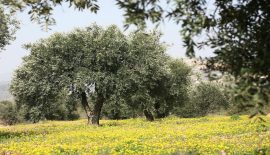The Feast of Shavu’ot
“You shall count seven weeks (…) Then you shall keep the Feast of Weeks to the Lord your God” (Deuteronomy 16:10)
Our Pentecost has amazing roots in the Old Testament. Pentecost comes from the Greek word ‘pentekosta’, which means 50. On the day that the Holy Spirit was poured into the hearts of those people in Jerusalem, the Feast of Weeks was being celebrated in the city. Thousands of people from different countries had come to Jerusalem for the feast. Not for Pentecost, as we know it, for the outpouring of the Holy Spirit was yet to come. They celebrated the ‘Feast of Weeks’. ‘Shavu’ot’ means ‘Weeks’. As described in Exodus 34 and Deuteronomy 16. After celebrating Passover in the night before the exodus, the people of Israel started on their journey through the Sinai desert. After seven weeks of seven days, they arrived at Mount Horeb. The next day Moses went up the mountain to receive the Ten Commandments, the visible sign of God’s Covenant with His people. Fifty days after liberation from deathly slavery they received the sign of the Covenant from God Himself.
Shavu’ot is an exuberant feast day: “And you shall rejoice before the Lord your God” (Deuteronomy 16:11). How wonderful to realise that exactly fifty days after Jesus’ resurrection from the dead we also received a sign of God’s faithfulness: The Holy Spirit as ‘the earnest of our inheritance’ (Ephesians1:14). Pentecost is also a feast of joy.
In Israel, the Feast of Weeks is also called the Feast of the Firstfruits. It coincides with the harvest of the wheat.
A part of the harvest, the firstfruits, was sacrificed to the Lord (Leviticus 23:10). Now it becomes even more special. For in the New Testament we, as Christians who receive the Holy Spirit, are also called firstfruits: “God chose you as the firstfruits to be saved, through sanctification by the Spirit” (2 Thessalonians 2:13). Just as the firstfruits of the harvest were consecrated to God, so we as believers are consecrated to God as firstfruits. That is why, as Christians, we no longer live for ourselves, but have become disciples of Jesus, followers of Him. Jesus is God’s only begotten Son: His firstborn. He gave His life as a sacrifice for us. Through the Holy Spirit in our hearts – we may believe in Him, and we ourselves become ‘firstfruits’. Isn’t it wonderful that both God’s teachings on Mount Horeb and the Holy Spirit of Pentecost do not come from within us, but are given to us from above, by God? It is all a gift of grace to the Jewish people as well as to Christians. We both live by grace. In Israel, Shavu’ot is celebrated with flower parades and feasts. We also celebrate our Pentecost with joy and music as a sign of the Christian church’s connection and solidarity with Israel and the Jewish people.






